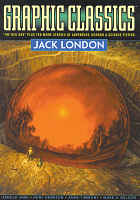 2006 (earlier edition 2005)
- available in soft cover
2006 (earlier edition 2005)
- available in soft cover
Graphic Classics Volume Five:
Jack London
 2006 (earlier edition 2005)
- available in soft cover
2006 (earlier edition 2005)
- available in soft cover
Written and illustrated by various.
144 pages
Published by Eureka Productions
website: Graphic Classics
Cover price: $11.95 USA / $14.95 CDN.
The Graphic Classics series from Eureka Productions revives the tried and true comic book sub-genre of the "classics adaptation" that various publishers have indulged in over the years. Though the Graphic Classic series is a bit different in that, instead of each black and white volume adapting a specific work of literature, it adapts a bunch of short workers in an anthology collection -- either works of a specific author, or, on occasion, works connected by a thematic genre. (I've reviewed other editions here and here and here).
Graphic Classics: Jack London, was the fifth volume in the series, and has been re-issued with extra pages and stories.
Jack London is of course best known for his tales of survival and adventure on the high seas (The Sea Wolf) or in the Canadian north (Whig Fang, Call of the Wild). Both milieus get an airing in this collection of his lesser known tales, as well as a couple of stories with a more fantasy/science fiction flavour (atypical for London) as well as crime drama. The stories range from dark and grim, to sardonic and humorous.
I've sometimes had mixed feelings about the artists assembled for these Graphic Classics collections, often the lion's share of the work going to cartoony, experimental, or almost underground comics artists, whose style I'm not necessarily that fond of. But this collection, though having a number of those, also boasts some striking, cleaner artists such as Mark A. Nelson on "The Big Red One", Arnold Arre on "The Wit of Porportuk", John W. Pierard of "The Francis Spaight". And, of course, a cartoonier style is certainly appropriate for light-hearted tales like "Jan, the Unrepentant". My least favourite contributor (though one who crops up in many of these volumes) is Milton Knight whose art I find just a little too confusing and contorted.
Unfortunately, it's the stories themselves that tend more to leave one a bit unsatisfied -- though how much is London's fault, and perhaps how much is attributable to the adaptations, is a question for others (not having read the source stories, I can't compare). Too often the stories seem to build to what seem like little more than shaggy dog endings -- for a guy thought of as an "adventure" writer, the stories themselves often seem a bit lacking in adventurous resolutions, some ending rather grimly, rather than with the characters overcoming their obstacles. In the sci-fi flavoured "A Thousand Deaths", seeming inspired a bit by Wells' "Island of Dr. Moreau", involving as it does a mad scientist on an island, the hero does triumph, but in a curiously abrupt, implausible way. Perhaps the adaptation rushed the story too much, or maybe London just didn't really have a feel for speculative fiction.
Still, part of the appeal of an anthology is that it can be a bit hit and miss -- that part of the enjoyment is simply turning the page, to see what new and different story awaits you next. This collection also includes a couple of short, text pieces -- one a short story, the other an essay by London called "How I Became a Socialist" which, no doubt, will seem a bit controversial in some conservative circles, but is intriguing as it gives the reader some insight into London's views and thinkings that might not be as apparent in his fiction.
Reviewed by D.K. Latta
Got a response? Email us
at lattabros@yahoo.com